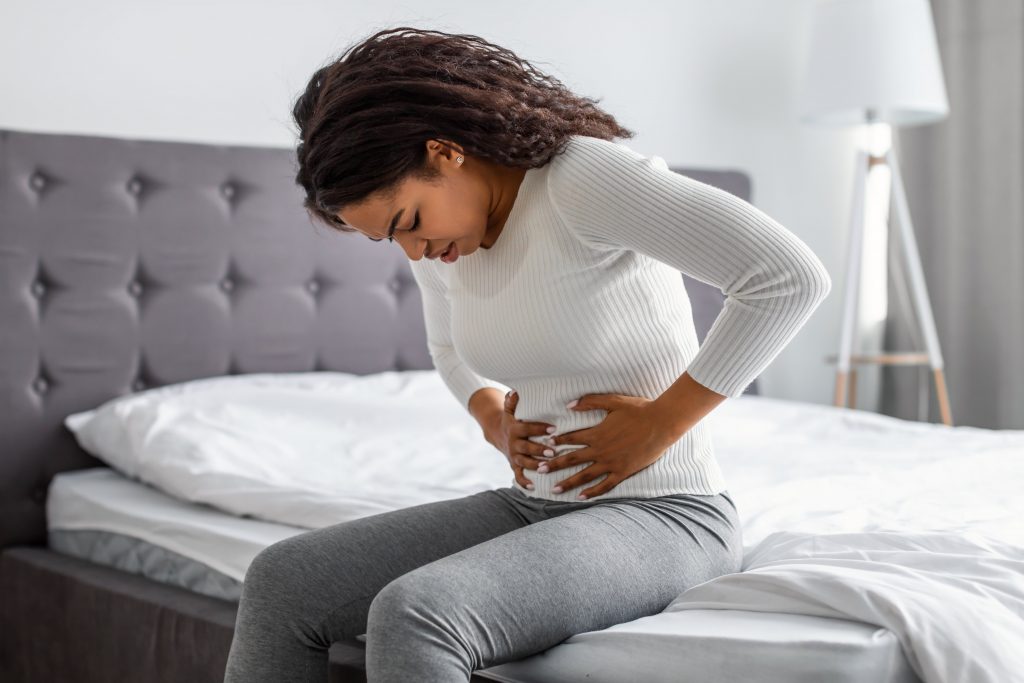
Endometriosis is a condition where the tissue that normally lines the inside of the uterus (the endometrium) grows outside the uterus. This can involve the ovaries, fallopian tubes, bowel and bladder.
Pain is caused because this tissue continues to behave in the same way it would in the uterus – it thickens, breaks down and bleeds with each menstrual cycle. Painful periods, painful sex, pain with bowel movements or urination, excessive bleeding, fatigue, nausea and more.
Endometriosis is often mistaken for other conditions including ovarian cysts, pelvic inflammatory disease, and irritable bowel disease. If left un-treated, endometriosis may even affect fertility.
Endometriosis Diagnosis
On average, it takes approximately 7 years to be diagnosed with endometriosis after the commencement of symptoms. Symptoms associated with endometriosis such as pain, inflammation and heavy bleeding can negatively affect a woman’s quality of life and ability to work.
Diagnosis can sometimes be made via ultrasound, but this is not always possible. Laparoscopy is the most common procedure used to diagnose and remove mild to moderate endometriosis.
Endometriosis Treatment Options
Surgical removal is one Endometriosis treatment option, as well as analgesic and anti-inflammatory medications, but not all of these are effective.
Hormone treatments are another option. These suppress the regular menstrual cycle, which slows or stops the formation of endometriosis. The Pill is the simplest way to accomplish this.
Research shows that approximately 13% of women with endometriosis use illicit cannabis to manage their symptoms. This comes with its own risks.
Cannabinoid Medicine
The good news is, in Australia, Cannabinoid medicine is a safe, and legal alternative to illicit cannabis for the management of symptoms associated with endometriosis, as well as other women’s health conditions including dysmenorrhea (painful periods), dyspareunia (painful sex), vaginismus (pain at vaginal opening) and more.
In 2017, it became possible for Australian doctors to prescribe medicinal cannabis for chronic health conditions that did not respond adequately to first line treatments. As of October 2021, there have been over 180,000 approved applications for medicinal cannabis within Australia.
What are Cannabinoids?
Cannabinoids are the active compounds found in medicinal cannabis. These compounds can assist in the management and treatment of endometriosis. Endocannabinoid receptors are abundant in the female reproductive organs, as well as the central and peripheral nervous system, and the immune system.
Cannabinoids can influence both physiological and pathophysiological functions of female reproduction, as well as affect the pain and anxiety often associated with endometriosis.
Cannabidiol (CBD) is a well-known, powerful and non-psychoactive cannabinoid that can be used in a variety of ways to manage the symptoms of endometriosis. CBD provides a safe alternative to illicit cannabis, and certain products on the market are THC-FREE, meaning they are suitable for people wanting to continue driving.
Anxiety and Depression
In addition to managing physical symptoms, medicinal cannabis may also work to manage the anxiety and depression that so often accompanies women’s health conditions such as these.
If you’ve tried first line treatments and haven’t achieved the results you’re looking for, cannabinoid medicine may be a safe, effective (and 100% natural) alternative for you.
To get started, you need to talk to a compassionate, qualified cannabis prescriber.
GET STARTED TODAY





Phenix Health delivers online health services 24/7 provided by Australian doctors and healthcare professionals.